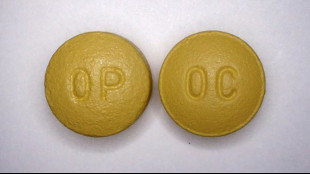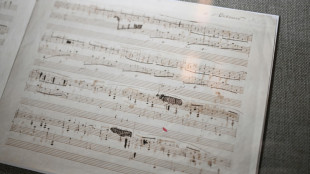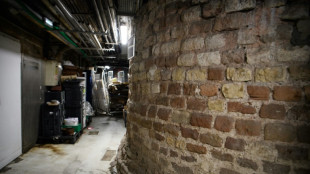
-
 English rugby boss vows to stay on despite pay row
English rugby boss vows to stay on despite pay row
-
US falling behind on wind power, think tank warns

-
 US news giant CNN eyes 200 job cuts, streaming overhaul
US news giant CNN eyes 200 job cuts, streaming overhaul
-
Sacklers, Purdue to pay $7.4 bn over opioid crisis: NY state

-
 Rubio chooses Central America for first trip amid Panama Canal pressure
Rubio chooses Central America for first trip amid Panama Canal pressure
-
Germany knife attack on children reignites pre-vote migrant debate

-
 AC Milan defender Emerson facing two-month injury layoff
AC Milan defender Emerson facing two-month injury layoff
-
'Shattered souls': tears as UK child killer sentenced to life

-
 China's Shenzhen to host Billie Jean King Cup Finals
China's Shenzhen to host Billie Jean King Cup Finals
-
Wall Street's AI-fuelled rally falters, oil slumps

-
 Trump tells Davos elites: produce in US or pay tariffs
Trump tells Davos elites: produce in US or pay tariffs
-
Progressive politics and nepo 'babies': five Oscar takeaways

-
 American Airlines shares fall on lackluster 2025 profit outlook
American Airlines shares fall on lackluster 2025 profit outlook
-
Sudan's army, paramilitaries trade blame over oil refinery attack

-
 France to introduce new sex education guidelines in schools
France to introduce new sex education guidelines in schools
-
'Brave' Keys deserves to be in Melbourne final, says Swiatek

-
 'Shattered souls': tears as horror of stabbing spree retold at UK court
'Shattered souls': tears as horror of stabbing spree retold at UK court
-
'Emilia Perez' lauded in Hollywood but criticized in Mexico

-
 Bayern's Davies ruled out 'for time being' with hamstring tear
Bayern's Davies ruled out 'for time being' with hamstring tear
-
Poland says purchased rare 'treasure' Chopin manuscript

-
 Calls for calm, Pope on AI, Milei on Musk: What happened at Davos Thursday
Calls for calm, Pope on AI, Milei on Musk: What happened at Davos Thursday
-
Ukraine orders children to evacuate from northeastern towns

-
 Hibatullah Akhundzada: Afghanistan's reclusive Taliban leader
Hibatullah Akhundzada: Afghanistan's reclusive Taliban leader
-
Argentina's record points scorer Sanchez retires from rugby

-
 Shiffrin set for World Cup skiing return at Courchevel
Shiffrin set for World Cup skiing return at Courchevel
-
'No conversation needed' for Farrell about Lions tour selection

-
 Wall Street's AI-fuelled rally falters
Wall Street's AI-fuelled rally falters
-
Drinking water in many French cities contaminated: study

-
 West Africa juntas tighten screws on foreign mining firms
West Africa juntas tighten screws on foreign mining firms
-
Spain govt to cover full cost of repairing flood-damaged buildings

-
 PSG loan France forward Kolo Muani to Juventus
PSG loan France forward Kolo Muani to Juventus
-
'Emilia Perez' tops Oscar nominations in fire-hit Hollywood

-
 Tears, gasps as UK court hears horrific details of stabbing spree
Tears, gasps as UK court hears horrific details of stabbing spree
-
St Andrews to host 2027 British Open

-
 S.African anti-apartheid activists sue govt over lack of justice
S.African anti-apartheid activists sue govt over lack of justice
-
Cocaine seizures in Rotterdam down sharply

-
 Keys shocks Swiatek to set up Sabalenka Australian Open final
Keys shocks Swiatek to set up Sabalenka Australian Open final
-
Formula One drivers face new sanctions for swearing

-
 UK to make case to Trump against whisky tariff: finance minister
UK to make case to Trump against whisky tariff: finance minister
-
After Musk gesture, activists project 'Heil' on Tesla plant

-
 Career-high 54 for Gilgeous-Alexander as Oklahoma City roll Utah
Career-high 54 for Gilgeous-Alexander as Oklahoma City roll Utah
-
ICC prosecutor seeks arrest of Taliban leaders over persecution of women

-
 Syria's economy reborn after being freed from Assad
Syria's economy reborn after being freed from Assad
-
Shoppers unaware as Roman tower lurks under French supermarket

-
 PSG finally click and fire warning shot to European rivals
PSG finally click and fire warning shot to European rivals
-
Saudi crown prince promises Trump $600bn trade, investment boost

-
 Unstoppable Sabalenka playing 'PlayStation tennis' says Badosa
Unstoppable Sabalenka playing 'PlayStation tennis' says Badosa
-
Sabalenka to take Badosa shopping after Melbourne rout - and pay

-
 Man City step up rebuild with signing of Marmoush for £59 million
Man City step up rebuild with signing of Marmoush for £59 million
-
Stocks mainly rise after Wall Street's AI-fuelled rally

| RIO | 0.75% | 61.58 | $ | |
| CMSC | -0.04% | 23.48 | $ | |
| NGG | 1.09% | 60.71 | $ | |
| SCS | 0.17% | 11.6 | $ | |
| GSK | 1.66% | 33.996 | $ | |
| BTI | 1.56% | 37.149 | $ | |
| RBGPF | -1.5% | 61.28 | $ | |
| RYCEF | 3.07% | 7.5 | $ | |
| CMSD | -0.61% | 23.815 | $ | |
| AZN | 0.63% | 68.635 | $ | |
| VOD | 0.71% | 8.44 | $ | |
| BCE | 1.22% | 23.435 | $ | |
| RELX | 0.23% | 49.376 | $ | |
| BP | 0.92% | 31.42 | $ | |
| BCC | 0.85% | 129.015 | $ | |
| JRI | -0.06% | 12.522 | $ |

Rising food prices shake North Africa as Ukraine war rages
Households across North Africa are rushing to stock up on flour, semolina and other staples as food prices rise following Russia's invasion of Ukraine, both key wheat exporters to the region.
The scramble is worse coming just weeks before the start of the holy month of Ramadan, when Muslims traditionally break a dawn-to-dusk fast with lavish family meals.
Tunisia, Morocco and Libya, along with several other Arab countries, import much of their wheat from Ukraine and Russia.
Some fear the Russian invasion could lead to hunger and unrest, with memories of how rising food prices played a role in several Arab uprisings last decade.
In one supermarket in the Tunisian capital, the shelves were bare of flour or semolina, and only three packs of sugar sat on a shelf near a sign that read: "One kilo per customer, please".
Store managers said the problem was "panic buying", not shortages.
Shopper Houda Hjeij, who said she hadn't been able to find rice or flour for two weeks, blamed the authorities.
"With the war in Ukraine, they did not think ahead," the 52-year-old housewife in Tunis said.
Bulk-buying ahead of Ramadan, which is expected to start in early April this year, is common in Muslim countries.
But some say the war in Ukraine has sparked a shopping frenzy.
- Fear of war -
Hedi Baccour, of Tunisia's union of supermarket owners, said daily sales of semolina -- a staple across North Africa used in dishes of couscous -- have jumped by "700 percent" in recent days.
Sugar sales are up threefold as Tunisians stockpile basic foodstuffs, said Baccour, who insisted there were no food shortages.
Each day pensioner Hedi Bouallegue, 66, makes the round of grocery shops in his Tunis neighbourhood to stock up on products like cooking oil and semolina.
"I am even ready to pay double the price," he told AFP.
Baker Slim Talbi said he had been paying three times as much for flour than in the past, "although the real effects of the (Russia-Ukraine) war have not hit us yet".
"I am worried" about the future, Talbi added, citing Tunisia's dependence on Ukrainian wheat.
Tunisia imports almost half of the soft wheat used to make bread from Ukraine. Authorities say the North African country has enough supplies to last three months.
Oil-rich Libya gets about 75 percent of its wheat from Russia and Ukraine. Morocco also relies heavily on the same source for supplies.
Algeria -- Africa's second-largest wheat consumer after Egypt -- does not import any from the two warring eastern European countries, instead sourcing it from Argentina or France, according to the bureau of cereals.
"There won't be any shortages -- wheat shipments regularly arrive at Algiers port," said harbour official Mustapha, who declined to give his full name.
Despite reassurances, panicked citizens recently ransacked semolina stocks in Algeria's eastern Kabylie region.
"War in Ukraine and all the semolina warehouses have been stormed," Mouh Benameur, who lives in the area, posted on Facebook.
- Recession, pandemic, recovery -
Food prices were on the rise in North Africa before Russia invaded Ukraine more than two weeks ago.
Moroccan official Fouzi Lekjaa pointed to a global economic pick-up following a pandemic-induced slump.
"With the recovery, the market price of cereals and oil products rose," he said.
Mourad, 37, a shopper in the Moroccan capital Rabat, said climate change and drought -- the worst in his country in decades -- were also to blame.
To keep prices affordable and avoid a repeat of bread riots that erupted in the 1980s, Tunisia subsidises staples like sugar, semolina and pasta.
For the past decade, it has set the price of a baguette loaf of bread at six US cents.
Algeria plans to scrap subsidies on basic goods, but has not yet done so.
After a truck drivers' strike this week, Morocco said it was mulling fuel subsidies for the sector "to protect citizens' purchasing power and keep prices at a reasonable level," according to government spokesman Mustapha Baitas.
In Libya, which found itself with two rival prime ministers this month, sparking fears of renewed violence, food prices are also hitting the roof.
At a Tripoli wholesale market, shopper Saleh Mosbah blamed "unscrupulous merchants".
"They always want to take advantage when there is a conflict," he said.
Summaya, a shopper in her 30s who declined to give her full name, blamed the government.
"They reassure people by saying there is enough wheat," she said, carrying two five-kilo (11-pound) bags of flour. "I don't believe them."
N.Mitchell--AT
